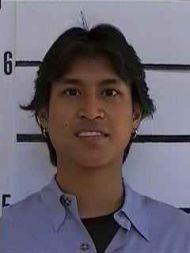 Alsace
Montenado was born November 18, 1977 in Taos, New Mexico. His father,
Rodrigo, was a painter and his mother, Alicia, was a sculptor. In 1996,
Montenado's parents were killed in a car accident and he was named
guardian of his younger brother, Edward, and sister, Angelique. Alsace
Montenado was born November 18, 1977 in Taos, New Mexico. His father,
Rodrigo, was a painter and his mother, Alicia, was a sculptor. In 1996,
Montenado's parents were killed in a car accident and he was named
guardian of his younger brother, Edward, and sister, Angelique.
After his parents died, Montenado moved to California with his
brother and sister, hoping to get into the entertainment industry and
earn enough money to support the three of them. He worked as a
Production Assistant on a Steven Seagal movie, but didn't enjoy the job
and felt his talents and abilities were unappreciated. After the shoot
ended, he found other odd jobs but had a hard time bringing in enough
money to feed, house and clothe himself and his two siblings. Edward and
Angelique ended up in the foster care system and Montenado eventually
left California and drifted across the country.
In 1999, he landed in Oxford, Mississippi and decided he had to find
some real direction in life. He got a job, applied for financial aid,
and enrolled at the University of Mississippi. With no family to go home
to, Montenado went to school year-round and earned his Bachelor's degree
in early 2003. He immediately enrolled in the Southern Studies graduate
program. Though he missed the Summer and Fall 2004 semesters as a result
of his involvement in the Bacchanals' Destruction film, he plans
to resume his coursework in January 2005.
Montenado's friends say he has always been a man quick to adapt to
his surroundings, and his sharp survival skills and motivational hustle
made him an invaluable asset on the set of Bacchanals' Destruction.
The cast and crew survived in large part on feasts of wild game, thanks
to his sharp aim. His official job was set artist, though he also
wrangled the players, arranged the lighting, built set pieces, designed
special effects and took care of many other vital details. With all of
that, he still had time to turn in a crucial acting performance in the
film’s opening scene.
In the isolation of the film set compound, he became the most
practical person: stoic, undefeatable and often unyielding. Corwin Fitz
relied on him as a trustworthy go-to man, and a reasonable sounding
board on the rare occasions that his uncompromising vision allowed for
human feedback. Some observers have said that, without Montenado, the
picture might have fallen apart.
At the same time, people not involved in the film who know Montenado are surprised that such a
self-sufficient man could tolerate the situation at the lodge, and they
wonder what made him stay when it seems like he easily could have walked
away.
|

